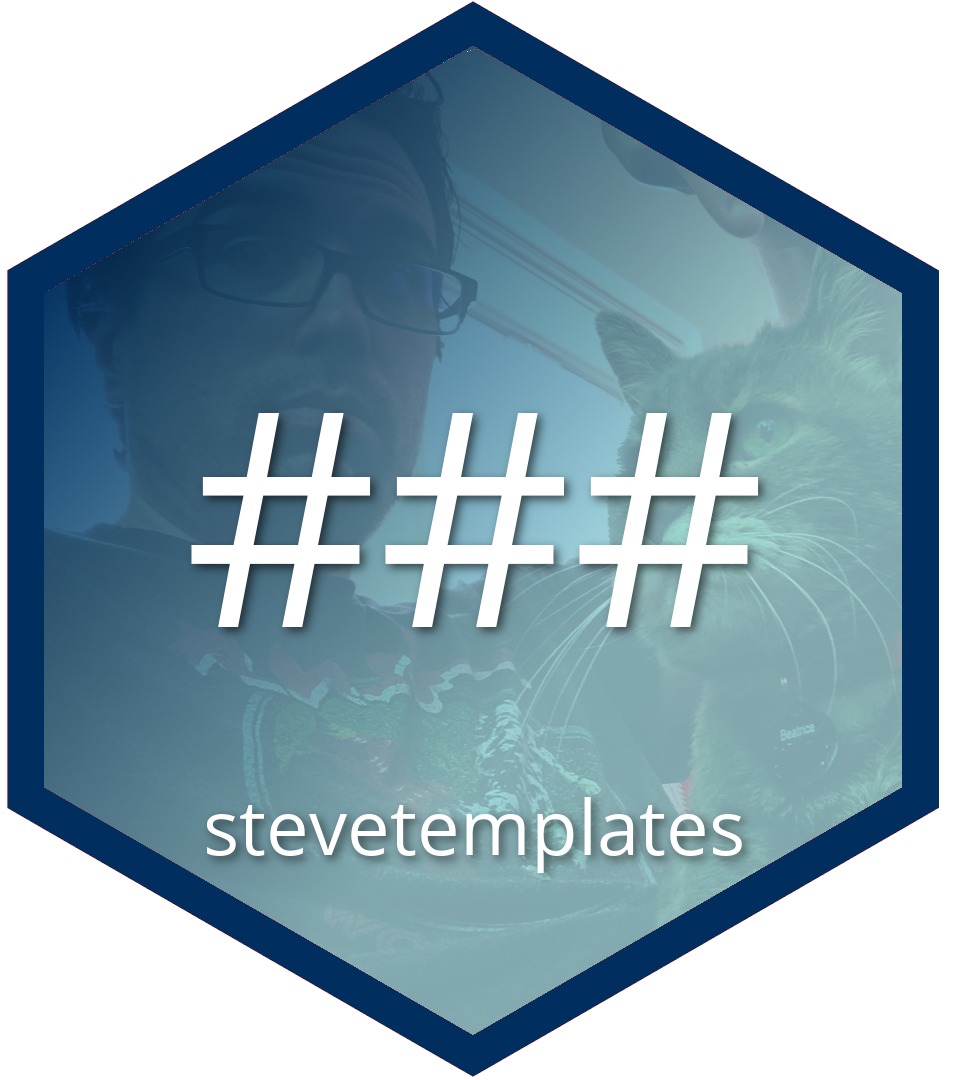This repository is a fork of the fantastic suite of Rmarkdown templates kindly published by Steve Miller which I will be tweaking to meet my own needs. I highly reccomend checking out the original package (see below).
stevetemplates is an R package to help you create lovely R Markdown
documents, primarily for conversion to LaTeX PDFs. They come from my
suite of R Markdown
templates, which
I’m making available as an R package. The impetus behind the R package
is three-fold. First, I’ve always wanted to get something on CRAN just
to say I did it. Two, I’m hopelessly vain and like making my first name
as a prefix for various R-related things (see also:
{stevemisc} and
{stevedata} as part of the
hypothetical {steveverse} for all things R and me (i.e. Steve)).
Three, it would be nice to cut down on how clunky my YAML can get and
it’d be nice for me and other users to have one single place to store
these templates that don’t depend on my cornball relative paths.
You can install this on CRAN.
install.packages("stevetemplates")The development version may also have some extra goodies not yet
published on CRAN. You can install the development version of
stevetemplates from Github via the devtools package. I suppose using
the remotes package would work as well.
devtools::install_github("svmiller/stevetemplates")The easiest way to use my templates is within Rstudio. Go to File > New File > R Markdown. Here, select any template you’d like to use. The version on CRAN should lag behind the development version, but the development version includes the following templates:
- Steve’s Anonymous Manuscript Template: This is an R Markdown template I used exactly once for an anonymous manuscript submission that needed to look an exact way. That submission was not published at that journal. I have not had the occasion to submit there again.
- Steve’s First Article/Manuscript
Template:
This is my first article/manuscript template and I made over five
years ago. I used this template quite often for my manuscripts, but
I switched to another template (also included in this package). It’s
here as a legacy addition. I don’t intend to offer much support for
this template anymore, but it has lots of goodies (e.g. appendix
support, suppressing title pages, etc.). You can call it in the YAML
with
stevetemplates::article. - Steve’s 2nd Article/Manuscript
Template:
This is my second article/manuscript template that I made in
September 2020. It’s patterned off the Association for Computing
Machinery (ACM) LaTeX
templates.
You can call it in the YAML with
stevetemplates::article2. - Steve’s Academic CV
Template:
This is my academic CV template I made in 2016, and I think it’s my
most popular. It’s certainly the one I see most often in the wild.
It’s also what I currently use for my CV.
You can call it in the YAML with
stevetemplates::cv. - Steve’s Non-Academic Résumé
Template:
This is an addition I made in 2020 to my suite of R Markdown
templates. It’s a bit clunky, but it’s useful and markup-light for
non-academic résumés. You can call it in the YAML with
stevetemplates::resume. - Steve’s Beamer
Template:
This is my go-to presentation template as I prefer Beamer PDFs to
other presentation formats. You can call it in the YAML with
stevetemplates::beamer. - Steve’s HTML Template: I created this template on the fly for
formatting academic manuscripts to an HTML document. Capabilities
are limited the extent to which there’s more CSS I need to adjust.
This manuscript features prominently in my
{steveproj}package. - Steve’s Memo
Template:
I created this for a memo I needed to write in 2019. You can call it
in the YAML with
stevetemplates::memo. - Steve’s Statement Template: I created this template in 2016 (I
believe). I use it for writing various “statements” (e.g. my
research
statement,
statement of teaching
philosophy)
when applying for jobs. I also use it for miscellaneous university
busy work. You can call it in the YAML with
stevetemplates::statement. - Steve’s Syllabus
Template:
This is one of my first templates, dating to mid-2016. I use it for
all my syllabi for any class I teach. You can call it in the YAML
with
stevetemplates::syllabus. - Steve’s Word Template: I created this template many years ago
and never worked with it because Word is limited in its
functionality. I’ve since come back to this template because its
limitations make it wonderful for “anonymizing” a manuscript for
submission to journals that are picky about PDF submissions. This
manuscript features prominently in my
{steveproj}package.
The user should notice that the YAML contains the functions (loaded in
this package) to compile these documents. They are basic wrappers for
rmarkdown::pdf_document. Please consult the corresponding posts and
the template
repository
for rudimentary examples and the underlying code to help guide your
usage. Importantly: some features/functionality might not be evident in
these templates because they may require other add-ons (e.g. R packages
or specialty fonts) that you may or may not have.

